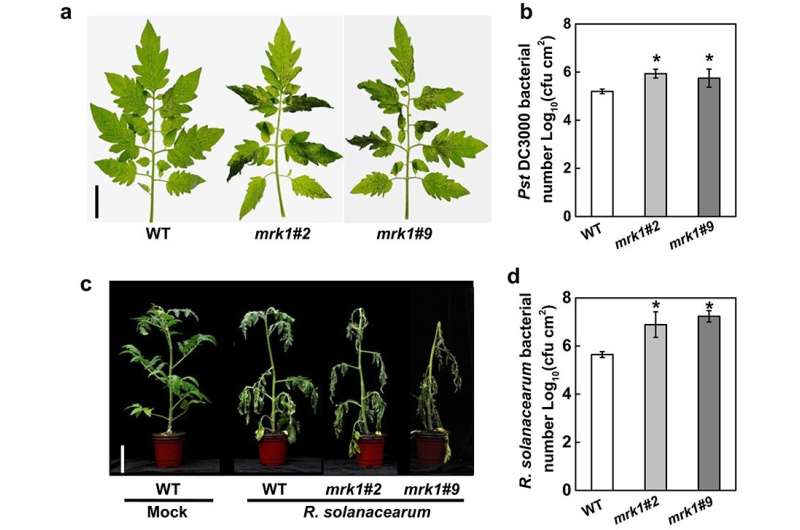The novel leucine-rich repeat receptor-like kinase MRK1 regulates resistance to multiple stresses in tomato

Tomato (Solanum lycopersicum L.) is an economically important vegetable crop worldwide, and its production is threatened by temperature fluctuations and pathogen attacks, causing severe crop losses. In recent work published in the journal Horticulture Research, Zhejiang University researchers characterized a positive regulator of resistance to multiple stresses in tomato.
They showed that the tomato LRR-RLK MRK1 participates in responses to multiple stresses by serving as a positive regulator. The expression of MRK1 was induced by cold and heat stress, as well as the bacterial pathogens Pseudomonas syringae pv. tomato (Pst DC3000) and Ralstonia solanacearum.
The authors then generated mrk1 tomato mutants by CRISPR/Cas9 gene editing. The mrk1 mutants exhibited increased sensitivity to cold and heat stresses, as shown by changes in plant phenotype, reduced maximum photochemical efficiency of PSII (Fv/Fm), and increased relative electrolyte leakage (an indicator of membrane permeability).
Compared with wild-type (WT) plants, mrk1 mutants showed lower expression of CBF1 and HsfA1a, which play critical roles in plant responses to cold and heat stress, upon exposure to cold and heat. Moreover, mrk1 mutants were more susceptible to Pst DC3000 and R. solanacearum, as reflected in more severe disease symptoms compared with WT plants at 5 days post inoculation (dpi) with Pst DC3000 and 10 dpi with R. solanacearum.
The pattern-triggered immunity (PTI) response is an important component of plant basal immunity, which can repel most virulent pathogens. PTI responses involve the production of reactive oxygen species (ROS), the activation of mitogen-activated protein kinases (MAPKs), and the transcriptional reprogramming of immunity-associated genes.
The flg22-induced production of ROS was greatly reduced in mrk1 mutants, and upregulation of the PTI-responsive genes OLP and LPSE was greatly suppressed in mrk1 mutants compared with WT plants. By contrast, the activation of MAPKs upon flg22 elicitation did not differ between mrk1 mutants and WT plants. These results indicated that MRK1 positively regulates several PTI responses.
The researchers also found that MRK1 could interact with FLS2 at the plasma membrane and with SERK3A/SERK3B in the cytoplasm using a bimolecular fluorescence complementation (BiFC) assay, and these interactions were then confirmed by a split-luciferase assay. Co-immunoprecipitation assays showed that the interactions of MRK1 with FLS2 and the co-receptor SERK3A/SERK3B MRK1 were not affected by the presence of flg22, suggesting that MRK1 plays a positive role in antibacterial immunity by acting as a component of the FLS2 and SERK3A/SERK3B complex to modulate PTI responses.
“This research provides insights into the complex structure of LRR-RLK-mediated signaling systems and provides a new target for the breeding of tomato with enhanced resistance to multiple stresses,” said the researchers.
Scientists characterize the potato L-type lectin StLecRK-IV.1, which negatively regulates late blight resistance
Qiaomei Ma et al, The novel leucine-rich repeat receptor-like kinase MRK1 regulates resistance to multiple stresses in tomato, Horticulture Research (2022). DOI: 10.1093/hr/uhab088
Provided by
Nanjing Agricultural University The Academy of Science
Citation:
The novel leucine-rich repeat receptor-like kinase MRK1 regulates resistance to multiple stresses in tomato (2022, August 8)
retrieved 8 August 2022
from https://phys.org/news/2022-08-leucine-rich-receptor-like-kinase-mrk1-resistance.html
This document is subject to copyright. Apart from any fair dealing for the purpose of private study or research, no
part may be reproduced without the written permission. The content is provided for information purposes only.
For all the latest Science News Click Here
For the latest news and updates, follow us on Google News.

